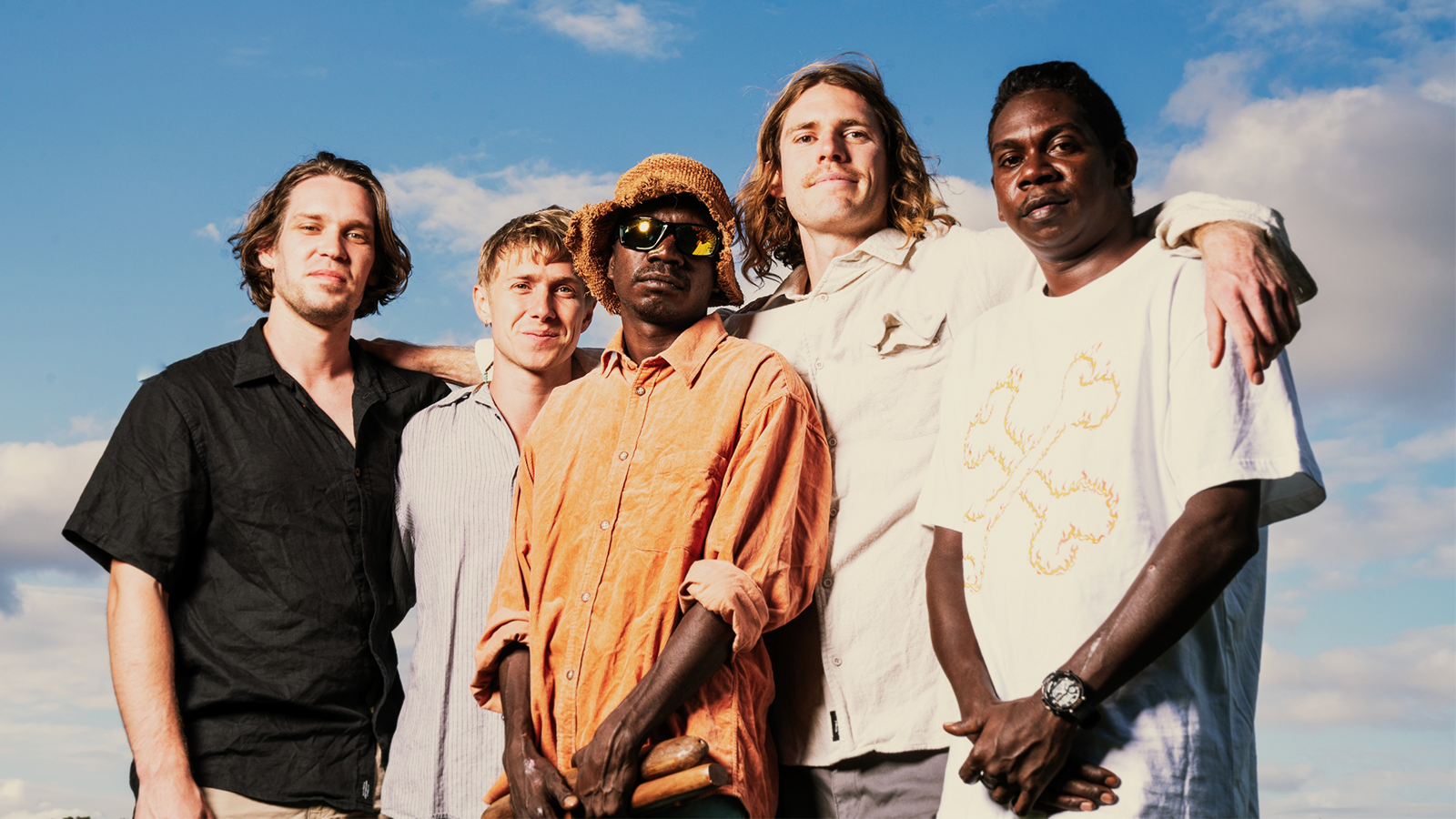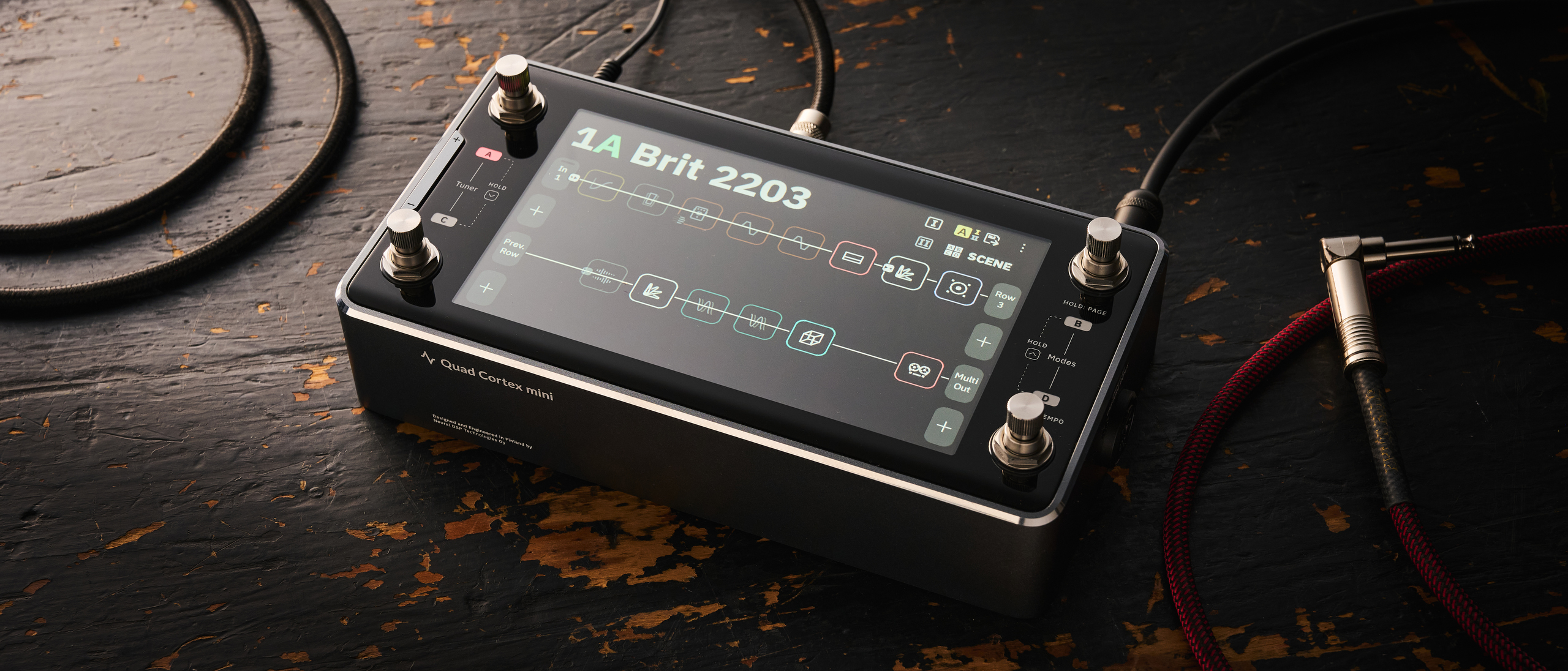King Stingray: “We feel very optimistic about music and our lives because of our amazing leaders”
On their self-titled debut, Yolngu surf-rockers King Stingray celebrate culture, friendship, and the art of the jam

All the latest guitar news, interviews, lessons, reviews, deals and more, direct to your inbox!
You are now subscribed
Your newsletter sign-up was successful
Growing up together in Yolngu country – the tight-knit community of Yirrkala in North-East Arnhem Land – Yirrŋa Yunupiŋu and Roy Kellaway were surrounded by incredible music. Both are descendents of Indigenous rock royalty, the former being the nephew of Dr. M and the latter being the son of Stuart Kellaway, both of whom were founding members of Yothu Yindi. With music in their blood, Yirrŋa and Roy performed together from their earliest days, whether it was killing time backstage while their parents rocked out to thousands every night, or at school talent shows. It was only a matter of time until they turned rocking out into full-time careers of their own, but King Stingray was never supposed to be what kickstarted them.
The project came out serendipitously, when Kellaway had a random idea for a song while the Yothu Yindi crew were camped at his dad’s studio in Tintenbar (a village on the far-northern coast of New South Wales). Within hours of jamming, that idea blossomed into ‘Hey Wanhaka’, and though it came about as a bit of casual fun, Kellaway (on guitars) and Yunupiŋu (behind the mic) knew they had a hit on their hands. They whacked it online under the moniker King Stingray, and through word of mouth alone, ‘Hey Wanhaka’ became one of 2020’s biggest summer anthems. Enamoured by the reception, Yunupiŋu and Kellaway powered on, ballooning King Stingray into a five-piece – including fellow Yolŋu folk as well as balanda (non-Indigenous peoples) – and whipping up an album of loose, loveable surf-rock belters primed for intimate clubs and sprawling festival stages alike.
Staunchly DIY, uniquely energised, and driven by a striking fusion of modern pop vibes and their own ancestral heartbeat – the band perform in both English and Yolŋu Matha, and twine their big electric guitar riffs with Indigenous instrumentation – King Stingray are a force to be reckoned with. As the band gear up to drop their self-titled debut album, Australian Guitar caught up with Kellaway to riff on how it all came to be.
You and Yirrŋa both grew up around some incredible musicians. Did that inform your own artistries when you started getting into music for yourself?
Yeah, for sure. We feel very optimistic about music and our lives, I think, because of our amazing leaders. We come from a community that is such a small little blip on the map, and yet so many leaders have come out of that community – whether they’re leaders in the land rights movement or the Yirrkala bark partition signings in 1963, or leaders of the music world like Dr. M and Yothu Yindi. And in art, y’know, there are so many amazing artists from East Arnhem Land that have gone on to sell their paintings all around the world.
It’s such an awesome little community, and I think that having so many incredible people come before us, doing what they love and having a red hot crack, it kind of gives us a nice little boost of confidence. It really pumps us up. And those small town vibes are great – people get behind you and support you, and then they go, “I was there since day one!” We’ve got so much love for our community, and the love that we get from our community is just as amazing.
So in making King Stingray what it is, how did you want to bring a new flavour to that evolving legacy?
That’s a really good question. Because y’know, we’re not reinventing the wheel, per se. There’s been amazing music of that [style] come out before – Yothu Yindi really pioneered that with their blend of Yolŋu and contemporary music. What we’re doing is playing our own style of music. And that was something we never really thought too hard about. It wasn’t like we sat down and went, “Okay, yeah, let’s make Yolŋu surf-rock!”
Sometimes up here, you don’t have a lot of exposure to pop music. It’s just so remote, it’s in the bush, and y’know, it’s not like we had Spotify – or even radio stations, sometimes. So influences were those family bands – Warumpi Band, Yothu Yindi, all those sort of Darwin swamp-rock bands that my dad was in… I think that influenced us to play that really sort of rock-y, upbeat sort of power-chord driven stuff.
All the latest guitar news, interviews, lessons, reviews, deals and more, direct to your inbox!
So having the kind of brotherly bond that you do with Yirrŋa, do you feel like you’re always on the same wavelength, musically, or know exactly what each other’s vibe is?
Yeah! I think it’s a really rare thing to be able to collaborate with someone well. As a muso, sometimes collaborations just don’t feel right. But for us, it just feels so normal. There’s no shame, there’s no ego, there’s no going, “Oh, we need to this and sound like this.” There’s absolutely no shits given at all, and no idea is a bad idea. We throw everything up in the air and we talk about every option.
Another part of it is that English is my first language, but Yolŋu isn’t, whereas Yolŋu Matha is Yirrŋa’s first language and English isn’t. So there’s ways we can work together in bridging that gap, and there’s this natural feeling of vulnerability when we do that. We’re all vulnerable – in terms of writing songs in Yolŋu Matha for me, and in writing English songs for the boys. And I think maybe that makes us a bit more open to going, “Let’s just try this.”
But again, we don’t really think about it. The first song we put out, ‘Hey Wanhaka’, was one that we wrote and recorded. We did it in this little studio that me and Dad had been working on at his place down in Tintenbar – Yothu Yindi were playing at Bluesfest, so the boys were all camped up at the shed, and me and Yirrŋa were just mucking around in the studio. I showed him this idea I had, and we just kind of laid some stuff down and went, “Yeah, this sounds real good.” And then we just took a real DIY approach to get the music out there. I did of all our own PR at first, and the hype train came from us just pushing this awesome song. It all just came about from us giving it a crack.
Is that the general process for a Kingray song?
It kind of changes between songs. I’ll bring an idea to Yirrŋa and Dima, and we can kind of workshop it from there – or vice versa, they’ll bring a song to me. This album also digs up a few old ideas that we had and played as kids. ‘Raypirri’ is a good example of how the band evolved: Yirrŋa used to play it on guitar, and there’s still this image I’ve got in my mind where we were playing it at the Yirrkala school years ago, as kids – we’d just be mucking around in the music room, and Yirrŋa would get so into it, he’d be up on the table and just rocking it out.
That’s always been a cracker song, so when we were putting the album together, we thought, “That really needs to be on there!” And then when we got Lewis [Stiles], the drummer, involved, it became a whole different thing. We had our first gig lined up – it was to support The Chats – and we were like, “Jeez, we need to pull this band together!” So we got our roommate Louie, who plays kit, to rock up one day and learn all the songs – he hadn’t even heard them – and the gig was like a day or two later.
He was playing with a punk band called Headlice, and he’d just came off the back of playing a gig with them, so he was still in punk mode. So we played ‘Raypirri’ first, song, and Louie just clapped it in so fast, we played it like a punk song and just went, “Whoa, this feels awesome!” We even had to dial it down a tad because he just went from zero to 100.

Ellie Robinson is an Australian writer, editor and dog enthusiast with a keen ear for pop-rock and a keen tongue for actual Pop Rocks. Her bylines include music rag staples like NME, BLUNT, Mixdown and, of course, Australian Guitar (where she also serves as Editor-at-Large), but also less expected fare like TV Soap and Snowboarding Australia. Her go-to guitar is a Fender Player Tele, which, controversially, she only picked up after she'd joined the team at Australian Guitar. Before then, Ellie was a keyboardist – thankfully, the AG crew helped her see the light…
